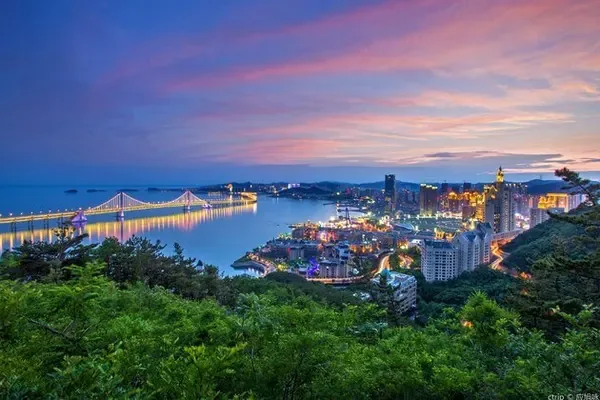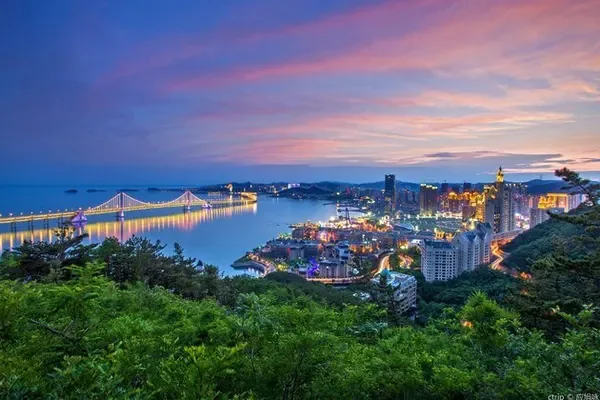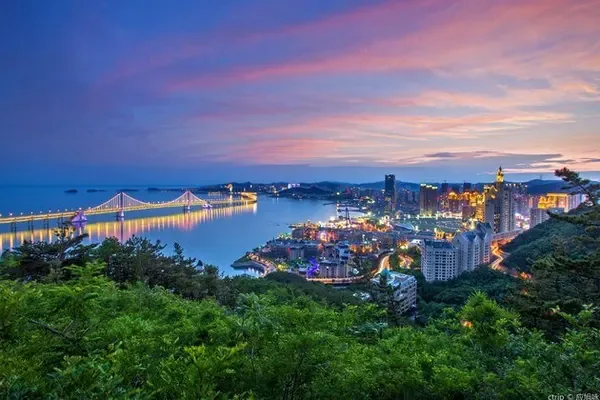The weather was fine on the weekend, and my wife had been talking about going to the horseshoe nest for a long time. It happened that the children had classes on Saturday and they didn't need to play with them, so they drove there. We went to Xishan Avenue, also known as Xishan Ancient Road North Road. The original avenue basically runs along the Yongding River Valley. It is an ancient road with the longest history in the west of Beijing. Xishan Avenue starts from Sanjiadian in the east, crosses Yongding River, passes through Liuliqu Village, crosses Shouerling, passes Xiehejian, Shuiyuzui, turns over Niujiaoling, passes through Qiaoerjian, Magezhuang, Shiguyan, Seshu Tomb, until Wangping Village. This is the main line of Xishan Avenue. There is a road from Wangping Village to Wangpingkou, leading to Zhaitangchuan. In the past, most of the coal produced in the Zhaitang area was transported out of the mountain through this ancient road. There are a large number of clear hoof nests on the roads of the two crossing lines of Shouerling and Niujiaoling. This ancient road is the one that has been used for the longest time among the ancient roads in the west of Beijing. It was not abolished until the Xia'an Highway was completed in 1977.
The current Jingxi Ancient Road Scenic Area is located in Shuiyuzui Village, Miaofengshan Town, Mentougou.
Sculpture at the entrance of Shuiyuzui Village
Sculptures on both sides of the road in Shuiyuzui Village
Sculptures on both sides of the road in Shuiyuzui Village
Sculptures on both sides of the road in Shuiyuzui Village
Ancient road tour map
The ticket office of the ancient road, the fare is 27 yuan
Sculpture next to the ticket office of the ancient road
Aerial photography of the entrance of Jingxi Ancient Road
Winding ancient road (aerial photography)
Trail entrance
Stone troughs and sculptures at the entrance of the ancient trail
Rockery at the entrance of the ancient road
Screen wall at the entrance of the ancient road
There are many ancient roads in the Mentougou mountain area, which were the only way for local villagers to go in and out at that time. Most of these roads are mountain roads, which were ground out by people's feet for generations. The main roads were built with funds raised by the government or businessmen. The road surface is generally about 2 meters wide, and it is mainly used for the transportation of pack teams.
At that time, the coal produced in the Mentougou mountain area was mainly carried by large livestock such as donkey snails. The pack team on the ancient road continued day and night. Deep hoof nests, these hoof nests are left in many places today, from which we can get a glimpse of the busy scene of coal transportation at that time.
The length of the ancient trail that can be visited now is about 2 kilometers.
The impression of the Jingxi Ancient Road should be that there was a lantern festival. There are many lantern sculptures on both sides of the road, but unfortunately many of them have been damaged.
Impression of Jingxi Ancient Road
Impression of Jingxi Ancient Road
Impression of Jingxi Ancient Road--Blacksmith Shop
Impression of Jingxi Ancient Road
Impression of the ancient road in the west of Jingxi--the ancient road was busy in the past, because there were few people walking, the grass on the road was already about 1 meter high.
Niujiaoling, where the ancient road passes, was the boundary between Chuweinan Township and Wangpingkou Inspection Department in Wanping County during the Ming and Qing Dynasties. A related city was built and it was an important gateway on Xishan Avenue. Guancheng was built at the place where the two hillsides faced each other, guarding the key point of the ancient road. Niujiaoling Guancheng sits east and faces west. It has a masonry structure. It is directly built with stones on the mountain rocks. The green bricks are bordered and bluestones are used as legs.
Niujiaoling Pass City
Niujiaoling Pass City
There are a large number of obvious hoof nests on the roads on both sides of Guancheng, about 300 of them, and the deepest one is 30 cm.
hooves introduction plate
Niujiaoling Hoof Nest
Niujiaoling Hoof Nest
Niujiaoling Hoof Nest
On the side of the road, there is a "Forever Free Husband Boundary Stele" erected in the 42nd year of Qianlong in the Qing Dynasty (1777 A.D.). The stele was once left on the roadside and lying in the grass. After more than 240 years of wind and rain erosion, the inscriptions on the inscriptions have become blurred and the body of the stele has also been damaged. In 2007, an antique hexagonal stele pavilion was built on the east side of Niujiaoling Guancheng to house the stele.
Hexagonal Stele Pavilion
Forever Freedom Junction Monument
"Forever Free Husband Boundary Monument" is a concrete manifestation of Kangxi and Ganzhou's policy of "prosperous age, no tax increase". Because the inscription on the inscription has been blurred, I didn't see the reason for it for a long time on the spot. I checked it when I wrote this travel note. The information, found the content of the inscription, and transcribed the full text.
Inscription: Fame forever
Tasting and watching the ancient Xunliang, whose Dele gold and stone are famous for hanging bamboo and silk, it is not bad to linger without sighing three times. Fortunately, today, in the prosperous age, Muwo County respects Huang Gong's rule. For example, in the Xishan area of Wanyi, the villages and ruins are scattered, and half of the banner people live together. The stones are thick and the fields are thin. Every time I sigh the hardships of life, I am far away from Beijing, and the journey back and forth is unbearable. Therefore, in the eighth year of Yongzheng, the head of the department, Mr. Ruan, issued a detailed constitution to pray for the exemption of the husband. Fortunately, the county head, the prince, had a heart-to-heart, and he was determined to make a plan. . Therefore, Limin Peide, whose surname was Zhao, was titled En, a monument was erected in front of Wanping, and a stone was erected in front of Wangping's thoroughfare. So far for more than 40 years, I have been looking up to him, and I can't bear to rely on them. There are so many husbands and servants, and the service is flourishing. Kuang Dian does not allow to invite special kindness again, how can it be repeated? However, if it is not before, it will be beautiful; if it is after, it will be prosperous. The ministers do not pretend to be presumptuous, and prostrate to express their feelings. I am honored by my boss Huang Gong to inspect the people's secrets, and I will give you a reward. I would like to ask Huang Gongjun, the respected county official, to criticize Wang Ping, Qijia, and Shigang. After detailed exemption on record. According to the detailed case in the past, Fang Zun Zhun ordered the three ministers to be exempted from the service, and not to be sent again, so as to relieve the poverty of the people. Hey, how lucky are Yu to be born under the rule of my Huang Gong! Husband is also from Piao (should be Li) Yang County, Zhenjiang Prefecture, Jiangnan. Recalling that since getting off the car, Kai Ti has a heart, has worked diligently in politics, settled the lawsuit with a fair sentence, cleared up the grievances, dealt with it carefully, and eliminated all the shortcomings of the procuratorate. Applying good rules, it is even more difficult to be a servant, billions of trillions are in mind, and the scorpion is the most important. Although you are sincere, you must be the same. The stele engraved on the stone is a sign of virtue, and it is used to raise the voice, to comfort Gantang's bereavement, to promote the advantages and overcome the disadvantages, and it will be the ceremonial form of the eternal reign.
At that time, in the forty-second year of Qianlong in the Qing Dynasty, Ding You was born in August.
Fuxiang: written by Shen Jiucheng, Liu Tingyu, and Sun Yongqi.
When checking the information, it was said that there should be another piece next to it that was erected in the 11th year of Tongzhi in the Qing Dynasty (1872), but I didn't see it at that time, so I also copied the inscription here.
The inscription said: "Gai Wen built bridges to help people cross, built roads for people to walk, and served the people's righteousness. This kind of charity is the first. In addition, the Xishan area relies on Wujin for health, and the capital's blowing Cuan is especially indispensable. Roads Su Er is blocked, and the livelihood of all walks of life is at stake." The inscription records that in the 10th year of Tongzhi, heavy rains caused disasters, washed away the roads, and the people did charity to repair the roads. At that time, commercial shops in Sanjiadian and Liuliqu villages were the main contributors to road construction. There were 14 coal factories in Sanjiadian village and 3 coal factories in Liuliqu village, which showed that this ancient road was the economic lifeline of coal merchants.
On the opposite side of the stele pavilion, there is a poem commemorating General Mao Lifang written by Mr. Shi Changpu (Shi Changpu is from Yanhecheng, Zhaitang Town, Mentougou District, and was once the director of the Mentougou District Educational Science Research Institute): "Niujiaoling Nostalgia for the Past in Guancheng--Commemoration of General Mao Lifang". General Mao Lifang, a native of Yuyao, Zhejiang, fought against the Hou Jin army in Jiulongao at the foot of Lingshan in the third year of Chongzhen in the Ming Dynasty, and was finally captured because of outnumbered with local mouthkeepers Zhang Bing and Zhang Guiqi. Later, the Jin army "supported the general and lured him to make huge profits", but was scolded by the general, "It is better to make a piece of jade than to make a tile", the general committed suicide and died for the country. , The Jin army will be wiped out here.
commemorative poem
commemorative poem
After passing Guancheng, there is a Guandi Temple, also called Laoye Temple. It is said that the original temple dedicated to Guan Shengdijun and Yang Bajie was destroyed during the war. The current temple was rebuilt on the original site in Shuiyuzui Village in 2012.
Impression of Laoye Temple
Impression of Laoye Temple
Impression of Laoye Temple -- the main hall of Zhongyi Hall
Murals in the main hall
Murals in the main hall
viewing pavilion
Overlooking the glass plank road
The entrance to the glass plank road, but it is not open
After visiting the Jingxi Ancient Road, passing through Jiuyuan Village in Wangping Town, it is the crossing of another "Wangping Ancient Road". "Wangping Ancient Road" passes through Wangping, Datai, Muchengjian, Zhuanghu Village, Qianjuntai, Zhangjiacun, Qilifen and other villages and towns join Jingxi Avenue in Junxiang Township. Jiuyuan Village is composed of Jiuyuan Village, Dongluopo Village, Xiluopo Village and Qiaoerjian Village. In the small mountain village of Xiluopo, there is an ancient house of the Yuan Dynasty. According to generations of villagers in Xiluopo Village, this is the famous dramatist and dramatist. Guan Hanqing, Zheng Guangzu, and Bai Pu are the former residence of Mr. Ma Zhiyuan, who is also known as the "Four Masters of Yuan Opera". His work "Tianjingsha · Autumn Thoughts" is known as the ancestor of Autumn Thoughts.
Jiuyuan Village Archway
Screen Wall in Xiluopo Village
Former Residence of Ma Zhiyuan
Former Residence of Ma Zhiyuan
The former residence of Ma Zhiyuan sits west and faces east, and it is a large courtyard. There is a small bridge and flowing water in front of the former residence, and "Ma Zhiyuan's former residence" is written on the screen wall in front of the gate, and there is an introduction of Ma Zhiyuan's life. Behind the screen wall is the courtyard, which was not open when we went, so we had to take some photos in front of the door.
Here is a copy of Mr. Ma Zhiyuan's "Tianjingsha · Autumn Thoughts": "Withered vines, old trees, dark crows, small bridges and flowing water, people, ancient roads, westerly winds and thin horses, the sun sets, and heartbroken people are at the end of the world." This poem can be regarded as a portrayal of the vicissitudes of the ancient road in the west of Beijing.
There is another poem in the introduction, which may be written about Xiluopo Village.
"Qingjiang Yin·Yexing": "The West Village is long and has few personnel, and a new cicada is making noise. Just when the sunflowers are blooming, the bees are buzzing early, and the dreams follow the butterflies while sleeping on the bed."
After chanting Mr. Ma Zhiyuan's poems, I couldn't help but have the urge to write a poem, so I wrote a poem to commemorate this trip:
Goodows
The Millennium Ancient Road in the west of Beijing,
The pack bells have faded in the valley,
On the bluestone of the ancient road,
It is engraved with the hardships of the pack team.
The mountain wind passes through the pass's city cave,
It seems to be the command of the pack team to drive the mules and horses,
Stepping into the deep hooves on the bluestone,
do you remember,
The westerly wind thin horse on the ancient road,
Watch the sun go down,
There are no more heartbroken people in the world.



